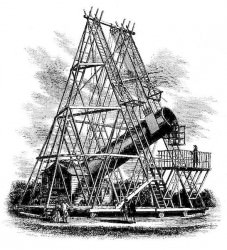 On this day in 1738, an astronomy legend was born - Sir William Herschel. Among this British astronomer and musician's many accomplishments, Herschel was credited with the discovery of the planet Uranus in 1781; detecting the motion of the Sun in the Milky Way in 1785; finding Castor's binary companion in 1804 - and he was the first to record infrared radiation. Herschel was well known as the discoverer of many clusters, nebulae, and galaxies. This came through his countless nights studying the sky and writing catalogs whose information we still use today. Let's take a brief, closer look at just who he was...
On this day in 1738, an astronomy legend was born - Sir William Herschel. Among this British astronomer and musician's many accomplishments, Herschel was credited with the discovery of the planet Uranus in 1781; detecting the motion of the Sun in the Milky Way in 1785; finding Castor's binary companion in 1804 - and he was the first to record infrared radiation. Herschel was well known as the discoverer of many clusters, nebulae, and galaxies. This came through his countless nights studying the sky and writing catalogs whose information we still use today. Let's take a brief, closer look at just who he was... Born as Frederick William Herschel, this Hanover, Germany native had nine brothers and sisters. During his teenage years, he and his brother, Jakob, were oboists in a military band. When war ensued, his father sent the pair to England to escape. Once there, Herschel continued his musical career by playing cello and harpsichord - eventually composing 24 symphonies, a handful of concertos and religious music. He continued to be a musician, with many appointments, until middle age. Most of his family also migrated to England, the most famous of which is his sister Caroline, who came to live with him in 1772.
But it wasn't music that was Herschel's passion. After he met English Astronomer Royal Nevil Maskelyne, he began construction on his own reflector telescope, spending up to 16 hours a day grinding and polishing the speculum metal primary mirrors. By age 35 he'd began his astronomical journey in earnest - and a year later he began recording his observations from the Great Orion Nebula to the rings of Saturn. Sir William's interest was taken by the study of double stars and with a 160mm telescope of his own construction, he began a systematic search for binaries among "every star in the Heavens" in October, 1779 and continued listing discoveries through 1792, eventually compiling three catalogs.
 During this time he continued to support himself and his sister with his music. In her biography, Caroline recounts how he would rush home between acts to scan the skies - and how she often had to clean pitch from mirror-making from his clothes to make him presentable. From 1782 to 1802, Sir William swept the skies, recording all he saw and sharing his discoveries with other astronomers. So devoted was he, that he even gave Caroline her own telescope in 1783, encouraging her to also make her own observations and discoveries. Herschel published his discoveries as three catalogues, a walloping 2400 entries, filled with distant nebulae and cosmic wonders. Over the time of his astronomical career, Herschel constructed more than four hundred telescopes - the most famous of which had an almost 50 inch diameter mirror and a 40 foot focal length!
During this time he continued to support himself and his sister with his music. In her biography, Caroline recounts how he would rush home between acts to scan the skies - and how she often had to clean pitch from mirror-making from his clothes to make him presentable. From 1782 to 1802, Sir William swept the skies, recording all he saw and sharing his discoveries with other astronomers. So devoted was he, that he even gave Caroline her own telescope in 1783, encouraging her to also make her own observations and discoveries. Herschel published his discoveries as three catalogues, a walloping 2400 entries, filled with distant nebulae and cosmic wonders. Over the time of his astronomical career, Herschel constructed more than four hundred telescopes - the most famous of which had an almost 50 inch diameter mirror and a 40 foot focal length!In later years, he and Caroline moved on to Windsor Road in Slough... a residence which would eventually be come to known as "Observatory House". It was during this time he married and eventually had a son - John. Caroline also moved on, yet continued to be his secretarial assistant. Sir William's astronomical career was quite illustrious - so much so that this article only highlights a few of his accomplishments. He observed and recorded the satellites of his discovery, Uranus, along with more obscure moons belonging to Saturn. He did work with infrared radiation, popularized the term "asteroid", studied the martian polar caps - revealing them as seasonal - and may very well have been the first to discover the rings of Uranus. His lack of a formal "astronomical education" never slowed Sir William Herschel down!
"I have looked further into space than ever human being did before me. I have observed stars of which the light, it can be proved, must take two million years to reach the Earth."
Herschel's life ended at a ripe old age of 84... Passing on at his beloved Observatory House. His son, John Herschel, would carry on in his father's footsteps and also became a famous astronomer. While few of us will ever be able to match Herschel's passion for astronomy, at least we can take a moment to look at the stars and wish this astronomy "great" a very happy birthday!
No comments:
Post a Comment